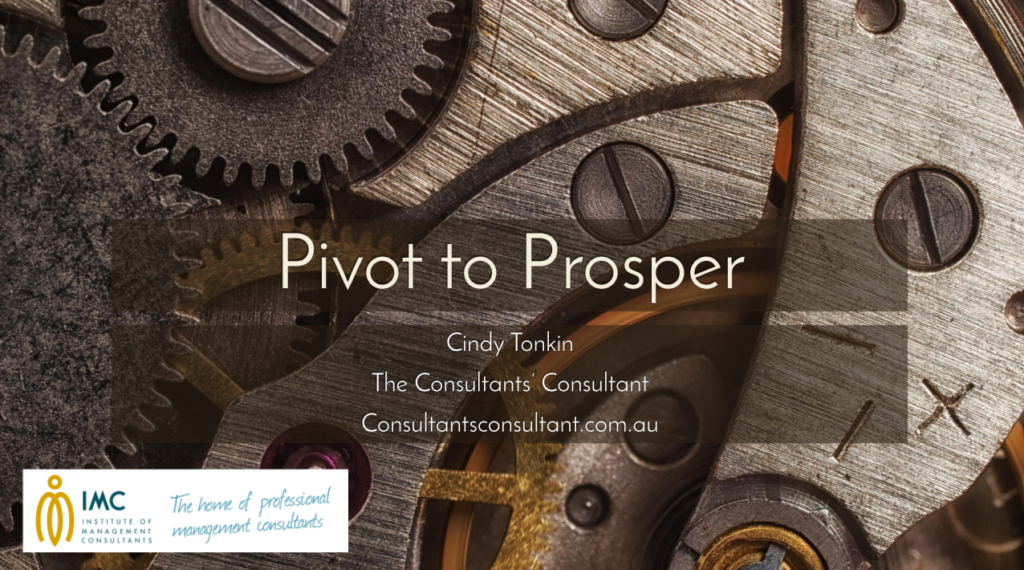

In this episode Cindy Tonkin (that’s me!) is interviewed by Helen Lawson-Williams. Helen has a lovely mind, and she asks good questions…
Find the podcast on
This time I get to answer the questions, and it’s fun.
References
I refer to a few leaders I interviewed in podcasts so far:
Some of the other references
- The 70:20:10 formula: Exposure, Experience, Education,
- My “scrapbook” blog on the topic of Get what you want at consultantsconsultant.com.au
- Links on motivating and managing others
Curated newsletters I love:
- Dan Pink’s newsletter
- Eric Barker’s Barking up the Wrong Tree
- Shane Parrish Farnam Street Blog
Books
Dan Pink’s books: Drive, When, To Sell is Human, A Whole New Mind, Free Agent Nation
Podcasts
Podcasts I mention
- Malcolm Gladwell
- Seth Godin
- Tim Ferris
- How I built this
- Shane Parrish’s Knowledge Project
- The Good Place
- West Wing Weekly
- And of course mine: listen to Liz Moore
Cindy Tonkin Transcript
Hi there. This is Cindy Tonkin and I’m the Consultant’s Consultant. I work with data science teams, helping them work even smarter, faster and nicer. If you’re brilliant and you want to be even better, this is the podcast for you.
In this episode you get to hear me answer the questions I’ve been asking other people. Helen Lawson-Williams has taken the time to be my interviewer and we talk around what makes a good data person, where do we find the best information? Lots of stuff. Listen in.
I’m here with Helen Lawson-Williams. Helen and I worked in the research insights and analytics together in Telstra. Today Helen is going to ask me the questions that I’ve been asking everybody else.
Helen L-W: One of the things that I’m really interested in hearing about, because you get a perspective across teams and across leaders of analysts that probably the rest of us don’t have the privilege of getting, in your observation what works? What are the things that people do differently that make them really effective in this space?

Effective data people
Cindy Tonkin: It’s partly to do with what’s going to succeed in the individual culture. So what would work at Telstra isn’t going to work at CBA necessarily. And it depends who the leader is. So when people are working with a strategic thinking leader like Liz Moore, then that ability to strategically think and bring her the shiny objects that will inspire her to essentially create new things and therefore make things good. That is important there.
If the leader is more into what’s pragmatic, I interviewed last week David Scott from RMS and as a leader, his stuff is all around what makes a difference to the end user. In his case the person in the traffic, so how does the data we use make a difference to that? His team’s all Agile, and for him it’s about what makes this team more collaborative. So if I can show you David how I do that, then you’re going to find me more useful as a leader.
You can’t tell from a CV what makes a good analyst
I’ve asked this question of everyone I’ve interviewed and everybody will tell you through your own personality filters what they think is important. So part of it is matching what your leader needs. When I introduced Shailendra Kumar last week he was talking about how he interviewed 250 different people for a job. Which I think, WOW! What was the agent for? His message was you can’t tell from a CV what makes a good analyst. And that’s an interesting thing. I can’t say what makes the best analyst or makes the best team. What I can say is based on who your leader is, the team will be that.
Lighting them up!
Who do I prefer to work with? I prefer to work with people who think strategically, who have a little bit of quirk, who will who prize the things that I believe are important and which I’ve seen over and over be useful. An ability to read people and ability to couch arguments or changes in a way that’s appealing and enticing for the person you’re dealing with or the group of people you’re dealing with. Not just what you should do, but here’s a reason why in your world this is good.
Helen L-W: In a sense then that’s exactly what you just earlier. It is understanding. Undertanding not just your stakeholder, ultimately your decision maker, and your allocator of priorities or resources. To understand what really will light them up or what’s going to move the needle for them.
Cindy Tonkin: Yes, absolutely. It’s kind of like everybody wants something. If you find out what it is, then can put your arguments in the way that they want that thing because it’s what they want. You can do it. So maybe, I’m saying they just need to be aware that people, ultimately, are the centre of all decision making and you’ve got to please those people.
They just they need to be aware that people, ultimately, are the centre of all decision making.
Helen L-W: That’s a hard message for folks who like numbers.

Beauty in numbers
Cindy Tonkin: It’s a terribly hard message. The beautiful thing I find is that when you start to reveal the algorithms that make people predictable to the people who love numbers they start to see that there are patterns to this. I think it’s shameful that our education really hasn’t. Our school education, certainly my school education, didn’t give me the keys to people. It gave me the keys to numbers.
It gave me, three unit mathematics making graphs and parabolas and all that kind of stuff. It gave me the science, it gave me the music, it gave me the subjects. I’m hoping it’s changing, but my education didn’t give me the keys to people. When I was in my late twenties I went into an NLP classroom and at the end of the day I was like, why didn’t someone tell me this before? I was already predisposed to idea that there must be some way this works. But if you’re a data person, you need to get some algorithms around how people work.
The beautiful thing I find, is that when you start to reveal the algorithms that make people predictable.. people who love numbers.. see that there are patterns .. if you’re a data person, you need to get some algorithms around how people work
Helen L-W: So thinking about that. The way that you framed it sounds random, I happened upon it as a framework.
Cindy Tonkin: Yes. People said to me, you will love this stuff.
Helen L-W: That is my follow up question. What are the most successful journeys that you’ve seen for people who started very much in that academic background, which is just get the numbers right. You will be set and get all the marks you need. You will be successful as long as you get the answer right. There’s a journey from there to being really effective in organisations. Tell me about good journeys.

People people
Cindy Tonkin: My very first job was at what was then called Andersen Consulting, which is now Accenture in different clothing. I was an arts graduate. I have a degree in French, I have a Master’s degree in Linguistics, which I got after Andersen’s. But before Andersen’s, I have a French degree and Andersen’s had a recruitment policy, I think they still do it, that they take people who have been successful at university. They don’t take people who are just IT people.
I got to learn how to program in Cobol. There was a guy there I believe might well have made partner within three years who was an IT graduate. He had the people thing down. He was a strong influencer. He actually managed to climb the ladder really quickly. He alienated all his all of his colleagues, kissed up and kicked down or kicked around, in fact. All the people above him were thinking, he’s got this down and he’s really thought this out and he’s done that. It was what we as Australians might call an American approach. Which was to be seen to be the smartest kid in the room. I’ve learnt a lot from him in retrospect because what he was doing, while I found it objectionable, actually got him the results he wanted. I wouldn’t do it that way now, but that’s the kind of the cautionary tale.
Helen L-W: That sounds like how not to do it.
Cindy Tonkin: But he got the success he wanted and the principles were the same. He was still reading what people wanted and providing it to them before they thought about it. He just wasn’t doing that for his colleagues. So he was trampling with his colleagues to get to the top.

Question, and seek answers
In terms of good things. I like to not to say people’s names cause I never know how they might feel. One of my clients at the bank was a senior analyst. His boss said to me, can you just play with him for a little while? We need to work out what’s happening. He’s great, except I don’t think he gets people.
So we actually sat in a room for an hour and he just asked me random questions about what happens. Such as, people tell me I’ve not said enough in meetings, but I didn’t have anything to say, what am I supposed to do? We talked through, what are your options for that? Then it was how do I tell my boss that he’s wrong? How do I tell a client that I can’t do this? He just fired questions at me.
Two days later I got a call from his boss saying what did you do? I just answered these questions. He went on to become a GM and he looked after his people, and solved really interesting problems. But it was almost like he hadn’t had the opportunity to ask those questions before. So part of it is, you’ve got to ask the questions. Then, you’ve got to look for the answers.
you’ve got to ask the questions. Then you’ve got to look for the answers
Helen L-W: Also in that example, given support and permission in the context of his work.
Cindy Tonkin: Absolutely. Your boss has to actually value this. If your boss doesn’t value this then we end up with that iterative, if you do what you’ve always done, you’ll get what you’ve always gotten. This is why our Liz Moore is so prized within the industry I believe, because she does give people that opportunity. She does look for the things that are greater. I were talking about the best success I know of in analytics, it’s Liz. Because she’s not just thinking about the numbers.

Go beyond the numbers
She’s thinking about how those numbers will be received, how that change will be perceived within the organization, how that change needs to be palatable. She thinks about the meeting before the meeting. She thinks about the personalities involved and the opportunities involved. And she knows about shiny objects.
Bring me a shiny object, so I can then take that shiny object and give it to someone else. Because there are so many un-shiny objects in organizations that attract our attention. To have a shiny object that really works. I’m using the word shiny object to just kind of be a placeholder for something that’s an interesting problem or a problem that’s going to make most enormous difference to our stakeholders.
Helen L-W: Tragically, not everyone can work with Liz.
Cindy Tonkin: And you know honestly, I would do it for free.
Helen L-W: And I know you do. So if you are listening, the way to get Cindy for free is to be awesome. There are not so many people in the world who can be or can aspire to be Liz. How do we as operators within organizations create more Liz’s.
Cindy Tonkin: Part of it is the 70, 20, 10 learning model or the 3Es Morgan McCall talks about. Exposure, experience and education. That you’re training doesn’t just come from sitting in a classroom. It comes from also being given exposure and experience. As managers, one of the most valuable things you can do is allow people to actually go to a meeting with you. But you can’t just go to a meeting. You have to actually debrief that. So they get the chance to ask the questions like in the example I gave. Basically, why did you do that? You stopped arguing. Why did you do that? Or you continue to argue, what was the thinking behind that?
As managers, one of the most valuable things you can do is allow people to actually go to a meeting with you.

Structure of coaching
The first time they go to a meeting they won’t even know to ask those questions. Essentially we are trying to get people to think outside the box, and think three-dimensionally above the box. So that Meta thing of managing upwards outwards and up and out. I’ve sat in meetings with people who when they come out say “that was a boring meeting”. But did you not see the body language when this was mentioned?
So, part of it is that the responsibility falls to the leader to actually say beforehand “there is a power struggle going on between x and y just watch their body language”.
It’s almost like giving them an assignment beforehand. “If you’re going to trail me to this meeting, you need to know that x and y have something going on. Tell me at the end, three signs that you saw in their body language that that was true”.
Essentially it’s about setting up some assignments that allow people to see in a way they didn’t.
When I run a training program, for example I will give people assignments to look at things they never thought of looking at before.
If motivation is, and to simplify, motivation is be moving away from a problem or moving towards a solution. “Based on the meeting that you’re about to go into, which one is each person using? Are they afraid of what’s going to happen?”
It’s giving them good briefs so that they see the different things are happening in the meeting and then a good debrief so they can ask questions.
Helen L-W: So would it be fair to describe that as a structured coaching session?
Cindy Tonkin: I’d call it a structured coaching session. Yes. I have in the past designed those kinds of interventions so that as a leader you can go, “Here read this. Now go into the meeting”.
Then out of the meeting ask these three questions, and then give them the chance to do that. It’s not something that leaders necessarily need to be good at.

On your Data culture
Remember we were talking before about outsourcing.
I outsource the production of this podcast to someone else because it’s not what I’m good at.
I think as leaders people need to be aware of the need to outsource to people whose job it is. My whole existence is essentially about how do people work and how do I communicate that more effective to people so that I can help people do that.
Leaders people need to be aware of the need to outsource to people whose job it is.
I was doing a session with someone and his team said something like, “some of our work is pretty boring”.
I said, “okay great, how are you motivating them?” They just looked at me like that was not even in their world.
“What things might you be able to do?”
And they answered, “I don’t know”.
Then the blinding flash of the obvious for me was, I read seven articles a week on how to motivate people, how to influence, how to persuade, how to be happy. At least seven, I’m blogging three, four times a week because I’m finding stuff and putting it in my blog.
My blog is not for everybody else. You can look at it if you want to, but the reason it’s there is so that I can remember when somebody sends me something I need to know about. It’s my scrapbook. It’s my Pinterest. It’s my Evernote. But it’s public so that I can just go, here’s the link.

Collect solutions
As an example when we did that session recently on asking great questions.
Four weeks beforehand I was just collecting anything that had anything to do with questions. It is all there. Then on the day I could go here’s the one blog post that links to 12 of those. So, it dawned on me when they said, “it’s boring”. Well, what are you doing about that?
You don’t have to make the work not boring. You have to make them okay to do boring work.
You don’t have to make the work not boring. You have to make them okay to do boring work because we don’t just come to work to work. We come to work to be part of a team. We come to work to do something greater than we can do by ourselves. We come to work to solve problems that we would never be given as individuals. And I know how to help you make that bit fun.
Helen L-W: Is that the difference between a supervisor and a leader?
Cindy Tonkin: Totally. Absolutely. There’s so much potential and it’s, it’s actually simpler than we think. So leaders need to circle back to the question. One of the easiest things you can do is give people exposure, but you need to give them exposure in a structured way so that what they’ve been exposed to helps them rather than prove to them that there’s no way they’d want to be a leader. And I think a lot of times it ends up being a cautionary tale of, “so I followed my boss to a meeting and shadowed and realised I don’t want that job”. But no, actually you might enjoy it. So it’s having a structured experience.
Helen L-W: And being supported to address some things that might feel uncomfortable.

Professional development
Helen L-W: Professional development. On that front from talking about how much time and effort you put into making sure that you’re at the forefront what you are doing, which is in large part coaching people to get better at what they do. The people side of what they do, working smarter, faster and nicer. Lets move into the kinds of things that you find most useful. We can see the output of your blog, but what are the things that really light you up? What do you get excited about?
Cindy Tonkin: At the moment I’ve just entered the listening to podcasts phase. December last year was the first time I regularly started listening to podcasts. Before then I just couldn’t see where would I fit it into my day. To be even more strategic and structural on this, I like new things. So I hadn’t been doing listening to podcasts. I listened to maybe three in my whole lifetime. Then I thought, I need to listen to Seth Godin’s podcast, or it could have been Malcolm Gladwell‘s podcast.
Then I just got sucked into the podcast vortex and started listening to Improv podcasts and musical theatre podcasts, business podcasts, the whole Tim Ferriss collection. And then Russell put me on to How I built this. Then I moved into a WeWork office, so anything to do with WeWork came up and that was really interesting. It just exploded.
Right now, I’m actually into The West Wing Weekly with a side order of The Good Place podcast. The West Wing Weekly watch the show, and then do a podcast about the show and recount what happens.

Take the best from the best
As a example if it’s an episode about tax reform, they’ll get someone on and say, it’s 20 years later talk to us about how relevant this is or isn’t. What’s the new issues in tax reform? One time, they had The West Wing clips on polling, and put three economists into a room and talked about how valid were the assumptions and the actual things that they said in the West Wing. How valid were they in terms of stats and economics.
Helen L-W: How chuffed would you be as Aaron Sorkin that that content is still relevant enough.
Cindy Tonkin: Still relevant. Absolutely. So, what excites me, inspires me? I’m pretty much inspired by everything, but I’m especially inspired by things that are new. That’s this week.
There are a couple of newsletters that I consistently subscribed to the Farnam Street podcast and the knowledge project from Shane Parrish. He has a weekly newsletter whatever he’s gleaned from books. I like it that he’s curating my content for me. Farnham Street is one and the other one is Eric Barker Barking up the wrong tree. They are people who go, I don’t want to reinvent the wheel. I want to find out the best of what everybody’s knows, and now I’ll bring you the best of the best.
That came from Dan Pink. I love Dan Pink’s work. A whole new mind, Born to sell. He’s really a journalist, but he’s a smart journalist, so he goes and finds all the research. He did Drive, the one on motivation. But, what excites me? Something new. Next year that will be something else.
Helen L-W: They say that curation is the skill of the 21st century.
Cindy Tonkin: Is it? I’m pretty good at curation.
Helen L-W: Curating the curators.
Cindy Tonkin: I’m curating the curators who are curating the curators. Exactly. Sometimes you don’t even know that you have a problem until you’ve read a blog about it.
This is Cindy Tonkin. I’m the consultants consultant and you’ve been listening to smarter data people. This is part of what I do to understand how it is that data sciences can be more effective in the workplace, smarter, faster, and nicer. And if you have a team and you’re finding them harder to manage than they could be, if you’re constantly trying to squeeze more out of your budget and out of their time, and if you’ve got stakeholders or they’ve got stakeholders who are less than happy, sometimes maybe a lot more than some times, it can be really annoying and it can make you feel incompetent. I can help you help them get to the important problems faster, target the waste in time, and save you time and money, and ultimately delight stakeholders so that you can feel competent again. It’s such a good feeling. Talk to me






